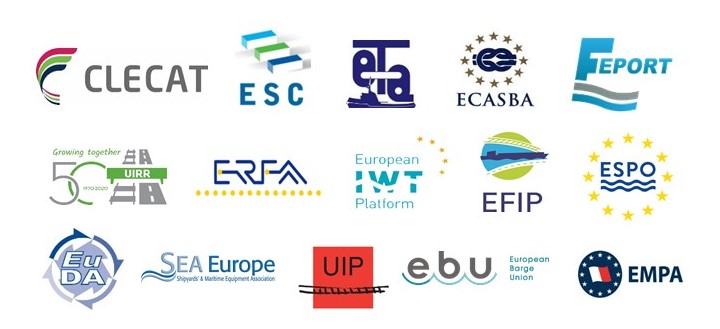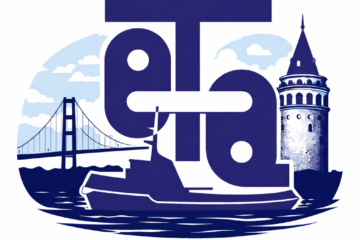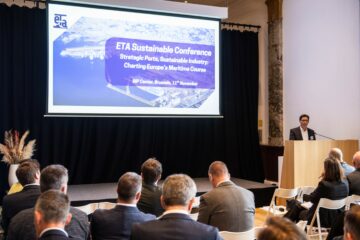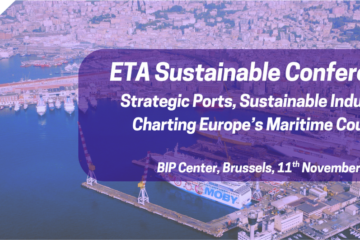
Brussels, February 11th, 2020
The Communication on the European Green Deal sets very ambitious objectives for the EU and sends a strong message to the rest of the world regarding Europe’s ambition to reduce emissions by at least 50% by 2030 and to transform its economy to become carbon-neutral by 2050.
The European supporting associations shown above (hereafter ‘the associations’) representing logistics service providers, seaport and inland port authorities, shippers, inland waterways, combined transport operators, rail freight operators, port operators and terminal operators, marine equipment manufacturers and shipyards welcome the Green Deal and believe that it can be an opportunity for Europe, particularly if it enables EU industries to benefit from a “new growth strategy” that will boost their competitiveness while becoming more sustainable. Such an ambition should be achieved while preserving a level playing field with other regions of the world.
The EU transport sector must continue to be a key enabler of sustainable trade and economic growth. It should therefore be supported in its effort to face the energy transition and remain a key priority for policy makers and Member States.
The success of the Green Deal will depend on the regulatory framework and financial instruments that will be mobilized to support innovation and the implementation of the proposed actions. Legal certainty for private investments as well as a financial stimulation of “first movers” will be an important cornerstone for the ultimate success of the Green Deal.
Equally important for becoming successful is the mindset that will lead all stakeholders to focus on a better integrated transport system rather than on stand-alone transport modes and other logistic services.
Another factor determining the Green Deal’s success will be the EU’s ability to play a leadership role in convincing non-EU countries to engage in the same direction. The associations therefore welcome the Commission’s efforts to enhance its “green deal diplomacy” and to convince other governments to set bold climate targets thus guaranteeing a level playing field.
Achieving a carbon neutral transport sector
The associations appreciate that the Communication will serve as a basis for the longer-term strategy to achieve a carbon neutral transport sector. The strategy should equally define the schedule of the net zero-emission target and the measures required at the EU level to provide legal certainty for private investment.
Achieving the reductions in transport can be divided into replacing fossil fuels with alternative fuels, alternative propulsion systems, improving the energy efficiency of the transport means (vehicles, vessels) and boosting the energy efficiency of the entire transport system. This should be done without compromising industry standards with respect to health and safety.
Reference can be made here to WATERBORNE (European Technology Platform) and similar initiatives such as ETP-ALICE which recommends necessary measures for an overarching view on logistics and supply chain planning and control, in which shippers and logistics service providers closely collaborate to reach efficient logistics and supply chain operations.
Unleashing the potential of multimodal transport to reduce GHG emissions
The Green Deal should be used as an opportunity to agree upon a legal framework that promotes a sustainable combination of all transport modes, taking the strengths and limitations inherent to each mode of transport into account. Combining rail, road, short sea shipping, inland waterways and air transport in a smart and efficient way will enable the further reduction of negative externalities.
This is crucial given that supply chain management, starting from an end to end perspective, whereby managers of both manufacturers and service providers try to find a balance between the use of different transport modes , warehousing and inventory level in order to satisfy their own objectives and the service levels required by their customers, eventually leads to cost optimisation and to GHG-emissions. In the same line of thinking, non-technological initiatives to decarbonise, such as multimodality should be encouraged in the perspective of end to end supply chains.
A comprehensive strategy for sustainable and smart mobility should look to revise key legal texts such as the TEN-T Regulation, the Rail Freight Corridor Regulation, the Combined Transport Directive, and the Eurovignette Directive. Achieving sustainable freight transportation should be part of any comprehensive strategy that the European Commission will propose to deliver the goals of the Green Deal in the field of transportation.
Furthermore, eliminating administrative and regulatory burdens hampering an efficient use of transport modes or negatively influencing the choice for a certain mode of transport will also be important to achieve a reduction of adverse impacts.
Several modes of transport are still confronted to cumbersome customs procedures. New technologies can also be used to provide the same or even better levels of safety and security while simplifying – or even totally removing – current bureaucracy.
The transformation of unimodal road haulage into multimodal transport-chains is seen as essential to achieve the European Green Deal’s objectives. Successful multimodality will require legislative changes to the key legal texts mentioned earlier.
Providing legal certainty to early movers
Industry will need support with tailored and easily accessible programmes to achieve as quickly as possible the targets for emission reductions and carbon-neutrality.
Specifying as well as maintaining deadlines and targets for emission reductions and carbon-neutrality are key to creating the much-needed predictability, and to securing a long-term direction for continuing investments. This will equally be important to encourage early movers.
Furthermore, as the transport sector prepares for technical advancements and innovation in line with international and/or EU policy, legal certainty and predictability, including for early movers, must be guaranteed both at the international level and/or at EU level. This is a necessary condition to underpin and stimulate investments to achieve the targeted reductions.
Mobilizing funding for research and dissemination of innovative solutions
To achieve the goals of the Green Deal, significant investments in research and development of innovative technologies will be key. Even more important will be the need for funding for the deployment of these innovative technologies aiming at making all modes of transport greener and energy-efficient, clean and safe.
There is an urgent need to unlock funding and to propose smart regulations which can provide real added value for the entire logistics chain. At the same time, the opportunity should be taken to make the different sources of funding more aligned, more transparent and more accessible for all the different parties in the transport system. The “administrative obstacle race” is still discouraging many stakeholders who wish to apply for funding.
Last but not least, the time between project calls, granting projects and presenting end results should be shortened. Currently the duration of projects is far too long compared with the speed of the climate changes.
An appropriate CEF transport budget and an innovation fund, which echo the role of transport in achieving the Green Deal’s objectives, will be crucial for its implementation, the dissemination of successful stories and the replication of innovative projects and solutions in the EU.
Ensuring a neutral approach when supporting innovation
The development and uptake of new technologies will be imperative to achieve the European Green Deal ambitions and targets. Given the wide range of possibilities and technologies being explored as well as the diversity and complexity of transport modes, it is important to have a policy and regulatory framework in place that promotes innovation in a technologically neutral way, and helps in sharing knowledge as well as the financial and operational risks of the development and deployment of new technologies. European partnerships in this respect are and will remain key.
In order to ensure an effective and sustainable transition to a carbon neutral transport sector by 2050, all technological options as well as (alternative) fuels should be explored and allowed to compete for reducing emissions across the different transport modes.
Prescriptive approaches in terms of technologies or solutions could have the opposite effect. At the same time, a holistic approach to technological innovations, alternative fuels and transport infrastructure across modes of transport will also be key since the choices for one mode of transport may have an impact on other modes of transport.
The supporting associations shown above look forward to working closely with the European Commission on a comprehensive strategy on sustainable and smart mobility along the principles addressed above to secure a healthy, sustainable and competitive transport sector.
For more information, please contact:
CLECAT (European Association for Forwarding, Transport, Logistics and Customs Services)
Ms Nicolette van der Jagt
Director General
Email: [email protected]
EBU
European, Barge Union
Ms Theresia Hacksteiner
Secretary General
Email: [email protected]
ECASBA (European Community Association of Ship Brokers and Agents)
Mr Jonathan C. Williams
General Manager
Email: [email protected]
EFIP (European Federation of Inland Ports)
Mr Turi Fiorito
Secretary General
Email: [email protected]
EMPA (European Maritime Pilots’ Association)
Ms Aileen Van Raemdonck
Secretary General
Email: [email protected]
ESC (European Shippers’ Council)
Mr Denis Choumert
Chairman
Email: [email protected]
ERFA (European Rail Freight Association)
Mr Conor Feighan
Secretary General
Email: [email protected]
ESPO (European Sea Ports Organization)
Ms Isabelle Ryckbost
Secretary General
Email: [email protected]
ETA (European Tugowners’ Association)
Ms Anna Maria Darmanin
Secretary General
Email: [email protected]
EuDA (European Dredging Association)
Mr Paris Sansoglou
Secretary General
Email: [email protected]
FEPORT (Federation of European Private Port Companies and Terminals)
Ms Lamia Kerdjoudj-Belkaid
Secretary General
Email: [email protected]
IWT (European Inland Waterway Transport Platform)
Mr Nik Delmeire
Secretary General
Email: [email protected]
SeaEurope (Shipyards’ and Maritime Equipment Association)
Mr Christophe Tytgat
Secretary General
Email: [email protected]
UIP (International Union of Wagon Keepers)
Mr Gilles Peterhans
Secretary General
Email: [email protected]
UIRR (International Union for Road-Rail Combined Transport)
Mr Ralf-Charley Schultze
President
Email: [email protected]



0 Comments